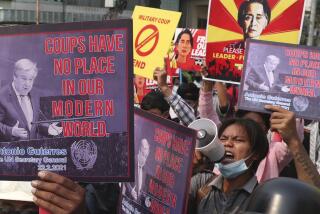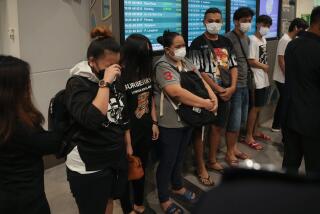DIPLOMACY : Cambodian Peace Plan May Unravel : The main guerrilla group is defying the U.N. mission, and officials worry that the process could collapse.
- Share via
PHNOM PENH, Cambodia — With government leaders and international finance experts meeting in Tokyo today to consider aid to bolster the fledgling Cambodian peace, the talks have been overshadowed by mounting concern that the peace process may unravel.
Two U.N. peacekeepers from Bangladesh were wounded Friday by an explosion in northern Cambodia, after two weeks of clashes between Phnom Penh government troops and forces of the notorious Khmer Rouge. They were the first “operational casualties” since February.
While the cease-fire violations trouble the United Nations, the real cause for concern has been the Khmer Rouge decision to boycott the second phase of the U.N.-supervised peace plan, as spelled out in the international accord on Cambodia signed in Paris last October.
The U.N. mission’s first phase began in February, with deployment of troops and civilian administrators belonging to a transitional authority. The second phase, which began last weekend, required troops from Cambodia’s four factions to begin reporting to 82 U.N.-supervised camps to be demobilized.
The armies’ demobilization was a key component of the peace plan, designed to ensure that security prevailed to enable political parties to campaign for a U.N.-run election in April or May next year.
The Khmer Rouge is the most powerful of three guerrilla factions, with an estimated 35,000 fighters. If it continues to boycott the demobilization, the program will fail because of the probable refusal of the Phnom Penh government to disarm.
The Khmer Rouge announced its decision to bar areas under its control to the U.N. transition authority last week after complaining that the agency should first verify the withdrawal of Vietnamese forces from Cambodia and begin to take over running the country.
Similarly, the Khmer Rouge has compared the United Nations to “colonizers” and hinted darkly that it may not abide by the results of an election, if the balloting is not held in a neutral environment.
Western diplomats here say the Khmer Rouge’s disenchantment became evident last month when the United Nations unveiled details of its $595-million aid package.
The proposed package included $110 million of “budget support” for the Phnom Penh regime so the government can keep paying teachers and other civil servants. But the Khmer Rouge saw the U.N. effort as a blatant attempt to support Phnom Penh at its expense.
There is considerable difference of opinion here about the true motives of the Khmer Rouge, one of the world’s most secretive political groups, which has been blamed for the deaths of more than 1 million Cambodians during its 1970s reign. Some diplomats believe that Khmer Rouge leaders have made a cynical decision to seize on the current impasse to force the United Nations to make concessions that would lead to weakening of the Phnom Penh regime. Another theory holds that the Khmer Rouge miscalculated in Paris last year about the viability of Phnom Penh, which seems stronger than ever, with international aid pouring in and commerce in full swing.
The key difference in the theories is that one implies that the Khmer Rouge will eventually compromise and rejoin the peace process, while the other suggests that the group intends to wreck the peace.
More to Read
Sign up for Essential California
The most important California stories and recommendations in your inbox every morning.
You may occasionally receive promotional content from the Los Angeles Times.













